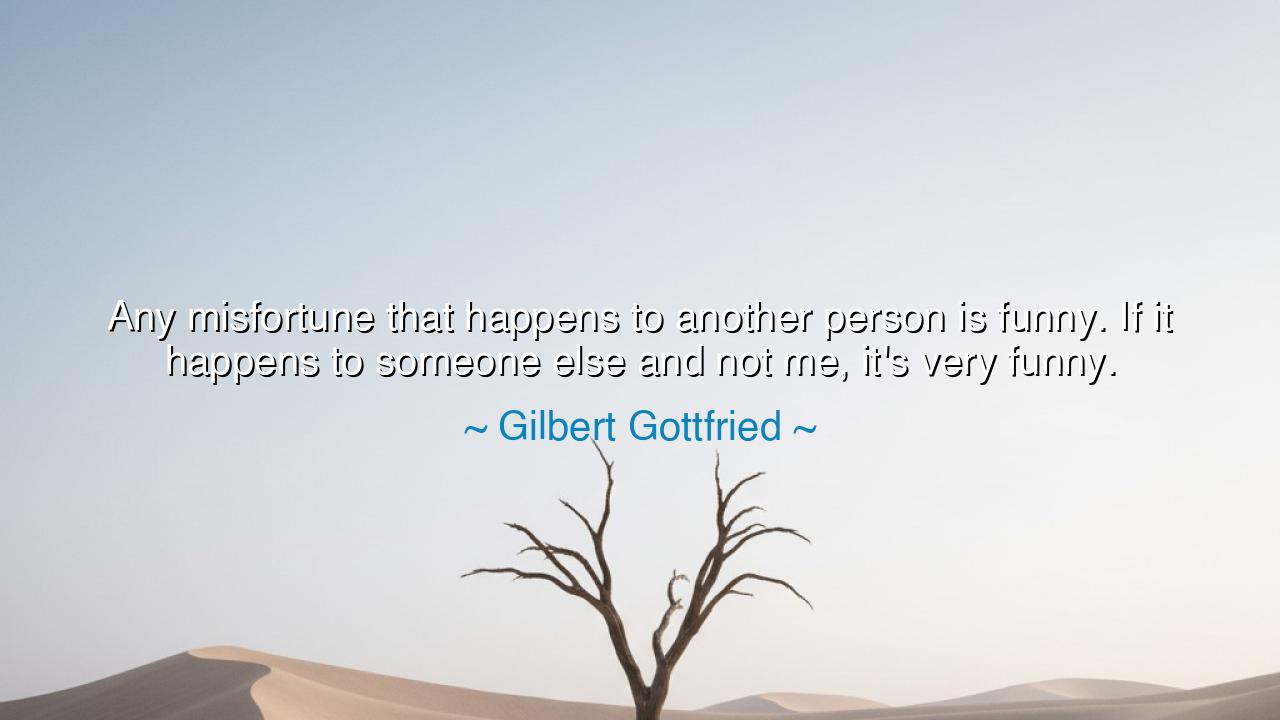
Any misfortune that happens to another person is funny. If it
Any misfortune that happens to another person is funny. If it happens to someone else and not me, it's very funny.






The words, “Any misfortune that happens to another person is funny. If it happens to someone else and not me, it’s very funny,” were spoken by Gilbert Gottfried, the legendary comedian known for his sharp wit, fearless humor, and the rasping voice that became his signature. At first glance, the quote seems mischievous, even cruel—a jest born from the dark edge of comedy. Yet, beneath its surface lies a truth as ancient as laughter itself: that humor, even when it springs from pain, serves as a mirror of our shared humanity. Gottfried’s words, while wrapped in irony, reveal the paradox of comedy—the way it transforms suffering into relief, and fear into laughter.
In the style of the ancients, one might say that Gottfried is speaking to the dual nature of human emotion, the strange alchemy by which tragedy and laughter intertwine. The Greek philosophers understood this intimately. They told of the god Dionysus, the spirit of both joy and madness, whose followers laughed in ecstasy and wept in despair in the same breath. For laughter and sorrow are siblings, born of the same fire that animates the human heart. Gottfried’s jest reminds us that we often laugh not because we are heartless, but because laughter is the soul’s rebellion against helplessness. When misfortune falls upon another, our laughter shields us from fear—it whispers, thank the gods, it was not I.
This truth can be seen throughout history. Consider the jesters of medieval courts, who made kings laugh by mocking the tragedies of life—plagues, famine, and folly. Their humor did not deny suffering; it gave it a form that could be endured. To laugh at another’s stumble was to affirm one’s own survival. The philosopher Thomas Hobbes once wrote that laughter arises from “a sudden glory”—the moment when we feel safe while witnessing another’s fall. This does not make laughter evil; rather, it shows its purpose. It reminds us of our own fragility while granting us a fleeting sense of triumph over fate. Thus, Gottfried’s irony is, in truth, a confession of the human condition: we laugh not from cruelty, but from recognition.
Gottfried himself was no stranger to controversy. His humor often walked the razor’s edge, daring to joke about tragedy mere moments after it struck. Yet, this audacity was not malice—it was courage. He believed, as the ancients did, that laughter purifies fear. When disaster looms, laughter breaks the spell of despair. After the attacks of September 11, 2001, when the world was silent with grief, Gottfried made a daring, uncomfortable joke. The audience gasped—but then they laughed. In that laughter, the frozen moment of horror cracked open, and humanity could breathe again. Like a fool in the court of tragedy, Gottfried used laughter to defy despair.
There is, in this, a lesson of great power. Humor is a weapon against darkness, and the laughter born of another’s misfortune—so long as it is tempered with empathy—can become an act of survival. The ancients knew that to laugh at tragedy is not to mock the fallen, but to proclaim, we still live. When a man slips and falls in the street, the first sound may be laughter, but the next is compassion. Laughter, in this sense, is not cruelty but catharsis—it releases fear before it transforms into care. Gottfried’s quote, then, is not a declaration of callousness, but an acknowledgment of the absurd dance between empathy and ego, sorrow and joy, that defines our nature.
Let us not mistake his words for cynicism. In truth, he is holding a mirror to the human heart, showing us how easily we laugh at others and how fiercely we guard ourselves. Yet, there is wisdom even in that self-preservation. To find humor in misfortune, even when it belongs to another, is to remember that life spares no one forever. One day, our own missteps will provoke laughter, and we must learn to laugh as others once did. The wise understand that the ability to laugh at another’s pain must one day transform into the humility to laugh at one’s own.
So, my child, take this teaching to heart: do not scorn laughter, even when it comes from dark places. It is the body’s way of healing from fear and the mind’s way of surviving chaos. Yet temper it with compassion. Laugh not to wound, but to release; not to separate yourself from others, but to join them in the absurdity of existence. When you see another stumble, laugh softly—then reach out your hand. For we are all, in the grand theatre of life, both the jesters and the fallen, the audience and the act.
And thus, Gilbert Gottfried’s words, though cloaked in jest, echo the oldest truth of all: laughter is the shadow of mortality, and to laugh is to live despite it. In every joke about another’s misfortune hides a deeper gratitude—the quiet awareness that we are still standing, still breathing, still able to find light even in darkness. To laugh, then, is not cruelty, but defiance. It is humanity’s way of whispering to fate: You have not broken me yet.






AAdministratorAdministrator
Welcome, honored guests. Please leave a comment, we will respond soon